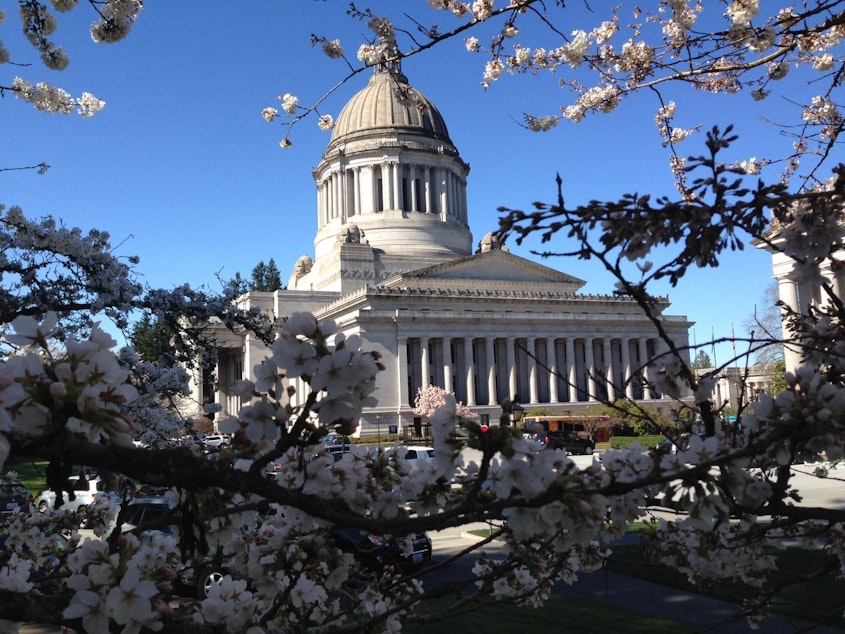Inslee facing increasing pressure to allow homebuilding and other sectors to reopen

Washington Gov. Jay Inslee is facing increasing pressure from state lawmakers to move quickly to reopen certain sectors of the economy, perhaps even before his current “Stay Home, Stay Healthy” order expires on May 4.
On Friday, three of the four legislative caucuses sent Inslee a request that he consider allowing a specific set of businesses to reopen, provided they adhere to strict public health guidelines.
The list included homebuilding, online auto sales, landscaping and in-home cleaning companies. Construction and auto sales are the state’s top two sources of excise tax revenue, according to a legislative analysis.
The caucuses also recommended that retailers in rural areas, in areas that have a low incidence of COVID-19 or that are able to provide curb-side or appointment-based services be allowed to reopen.
Currently, only essential retailers like grocery stores and pharmacies are allowed to operate.
“We are trying to convince the governor to be somewhat more aggressive,” said House Deputy Majority Leader Larry Springer of efforts to jumpstart the economy in the wake of the COVID-19 pandemic. Springer, a Kirkland Democrat and wine shop owner, is leading the House Democrats’ “business recovery strategy.”
Sponsored
In response to the recommendations, an Inslee spokesperson emailed: “We appreciate everyone’s input and we’re glad to have legislative leaders at the table. At this point we are still reviewing proposals.”
The recommendations sent to Inslee came from the House Democratic and Republican caucuses and the Senate Democratic caucus. It was not immediately clear why Senate Republicans did not also join the effort.
However, separately, House and Senate Republicans on Friday released what they are calling their “Safe Economic Restart Plan.” It calls for the convening of a “Restart Task Force” and allowing a number of sectors to resume operation, including auto dealers, car washes, hairdressers and barbers, flower shops, dentists and accountants.
“Our state’s economy was particularly strong before things caved in, and we believe it can get there again – and sooner if the governor and Legislature will support these very reasonable ideas,” said Senate Republican Leader Mark Schoesler in a statement. In recent days, Schoesler has criticized Inslee for being too restrictive in his orders.
In addition to calling for the swift reopening of some businesses, the plan from House and Senate Republicans recommends a series of one-day sales tax “holidays,” a one year business and occupation tax exemption for small businesses and a suspension of the 2021 minimum wage increase.
Sponsored
In response to the Republican plan, Inslee's spokesperson said Republicans had not brought their proposals to the governor’s office.
“I’ve no doubt the governor and staff will review them,” said Mike Faulk, the spokesperson, in an email. “The governor is happy to work in good faith with legislators from all four corners as he has done from the very beginning.”
Faulk noted that the governor has an existing bipartisan task force of legislators that is working on the economic recovery.
The governor’s stay home order, issued March 23 and extended on April 2, effectively shuttered an estimated 230,000 “non-essential” businesses. By contrast, Oregon Gov. Kate Brown’s order is more flexible and allows a broader universe of businesses to continue to operate so long as they can maintain social distancing and take other precautions.
Inslee has been insistent that broad-based social distancing is necessary to slow the spread of the virus, reduce deaths and prevent hospitals from being overwhelmed. However, in recent days Inslee has said he’s hopeful the state can begin the slow process of reopening after May 4.
Sponsored
He’s also convened a “work group” that’s been meeting twice a week to discuss ways to safely restart homebuilding – something minority Republicans have been pushing hard for.
Besides the economic effects of the shutdown on business owners and their employees, state lawmakers are also mindful of the cascading toll on state revenues, which Springer predicted will be “devastating.”
“The economic hardship is coming, we all know it, it makes sense to blunt it as much as possible and that means you’ve got to get commerce up and running again, at least to some level,” Springer said.
Springer described the proposal to Inslee as “just step one” and said lawmakers may bring additional recommendations to the governor soon

